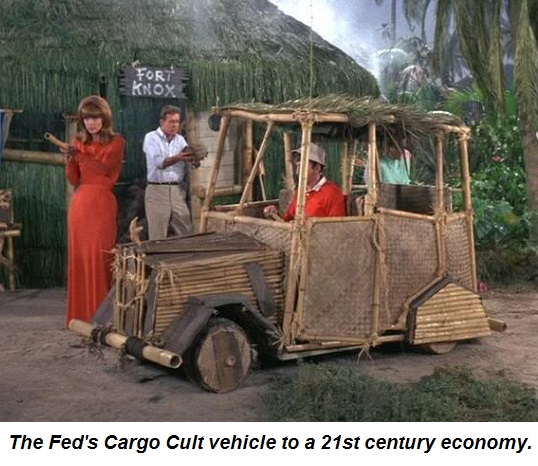The Inevitable Failure of Mechanistic Monetary Policy
April 3, 2015
Our current faith in central banks' ability to "make the economy all better, all the time" is horrendously misplaced.
We are living in the Cargo Cult Era of Central Bankers. The era began in earnest on December 5, 1996, when Federal Reserve chairman Alan Greenspan cautiously wondered aloud if the stock market was exhibiting "irrational exuberance."
The stock market promptly tanked. In this era, the utterances of central bankers exert more influence over markets than fundamentals.
This simplistic faith in the Cargo Cult magic of central banks is based on the absurd notion that two levers--interest rates and buying debt--can control and guide an immensely complex economy. Central bankers are well-versed in arcane incantations such as Operation Twist and aggregate demand, but if we strip away the mumbo-jumbo we find only two levers: interest rates and the purchase of debt.
Documentary film maker Adam Curtis explored the inherent limits of mechanistic monetary models in Episode 3 of his 6-part series, Pandora's Box (1992).
The wizards of monetary policy make the implicit assumption that monetary policy is the most important factor in an economy's expansion or contraction. But an economy is far more than interest rates, inflation and the purchase of bonds and other assets.
An economy is also the education or mis-education of the next generation of workers, the creative destruction wrought by technologies, the cultural appetite for risk and what I call the infrastructure of opportunity--the complex mix of attributes that either encourage social mobility or preclude it.
Two analogies will help us understand the absurdly simplistic myth of central bank magic. One is the forest fire analogy I discussed in The Yellowstone Analogy and The Crisis of Neoliberal Capitalism (May 18, 2009).
In essence, central banks no longer allow the "fires" of debt writedowns and credit contraction (i.e. recession) to burn away the dead wood that piles up after rapid expansion/good times/ leverage. As a result, the dead wood piles up higher and higher every season, until a chance spark (the infamous Black Swan) ignites the dry tinder and the subsequent conflagration burns down the entire forest.
The second analog is health-related. A fellow in very poor health goes to the clinic for a blood pressure test. He is overweight, dangerously unfit, smokes a pack a day and self-medicates himself with daily overdoses of alcohol. As a result of his disastrously poor health, is blood pressure is through the roof.
In our analogy, the stock market is the blood pressure reading. Markets (stocks, bonds, commodities, real estate, debt, risk, etc.) reflect the realities "discovered" by the interplay of buyers, sellers and information such as profits, debt levels, sales, etc.
Rather than address the underlying causes of the patient's poor health, the doctor (central bank) gives the guy two powerful drugs to slam down his blood pressure reading. This is the equivalent of central banks juicing markets with quantitative easing and zero-interest rates (ZIRP).
Is the guy healthier as a result of the massive injections of drugs? At least temporarily, his chances of dying are reduced by the drop in blood pressure. But over the longer term, this doctoring of one reading of health (i.e. the stock market) is not going to reverse the intensely negative consequences of poor diet, zero fitness, smoking and over-consumption of alcohol.
Our current faith in central banks' ability to "make the economy all better, all the time" is horrendously misplaced. Mechanistic monetary models are fine for manipulating a simplistic measure of economic health, but they are completely inadequate to the task of restoring fundamental health to a very sick patient teetering on the abyss.
Bonus analogy: here's the Fed's Cargo Cult vehicle to a 21st century economy:

NOTE: Contributions/subscriptions are acknowledged in the order received. Your name and email remain confidential and will not be given to any other individual, company or agency.
|
Thank you, Michael K. ($5/month), for your splendidly generous contribution to this site-- I am greatly honored by your steadfast support and readership. |